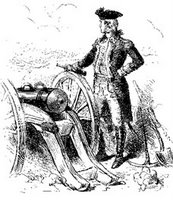According to
Agnes Austin (1769-1861), when the Revolutionary War began, her father
John (born in 1722) was at
James Barrett’s farm in
Concord helping to prepare stores for the provincial forces.
Austin and the seven men he was supervising evidently hid their supplies and dashed away before Capt.
Lawrence Parsons and four companies of
regulars arrived to search the place. Austin later told his daughter about how
Rebeckah Barrett treated those soldiers, so he probably went back to the house after they had left but didn’t participate in the battle.
Meanwhile, Agnes Austin’s other anecdotes indicate that she was home in
Charlestown, in place to see those soldiers march in at the end of their long day.
Over the next two months, most families moved out of Charlestown, which was caught between British-held Boston and the besieging
provincial army headquartered in
Cambridge. John Austin’s family probably joined him at some safe place to the west. On 17 June, the Battle of
Bunker Hill caused most of Charlestown to burn (and shown above), and that probably included the Austins’ empty home.
Two days later, a committee of the
Massachusetts Provincial Congress had recommendations for supporting the
artillery regiment (which had suffered a supply problem in the battle):
That, in addition to the storekeeper already appointed by this Congress, there be established four conductors of stores, and two clerks for the ordnance department; and a company of artificers, to consist of a master carpenter or overseer, with 49 privates; and the committee of safety be desired to recommend to this Congress, fit persons for the offices abovenamed. . . .
Your committee, furthermore, beg leave to report an establishment for the officers and privates above mentioned, viz,: The storekeeper, $80 per month: four conductors, each $48 do. [ditto]: one master carpenter, or overseer, $80 do.: two clerks, each £48 do.: 49 privates, they to find their own tools, $50 do. each.
That afternoon the Committee of Safety responded:
Pursuant to a Resolve of the Provincial Congress sent to this Committee respecting the nomination of four Conductors, two Clerks, and one Overseer for a company of Artificers in the regiment of Artillery; they beg leave to recommend the following persons to the office affixed to their names, viz: Mr. John Ruddock, Mr. John Austin, Mr. John Kneeland, Mr. Thomas Uran, Conductors; Mr. Nathaniel Barber, Jun., Mr. Isaac Peirce, Clerks; Joseph Airs [Eyres], Overseer of the Artificers.
All of those men besides Austin were from Boston, and all had been active in Whig politics before the war. Ruddock was the son of the late North End magistrate with the same name; the family had fought with British soldiers in 1768-70. Peirce was a
town watchman. Barber’s father was part of the North End Caucus and is one of the names inscribed on the
“Liberty” punch bowl. Uran and Eyres had
helped to guard the tea ships. Kneeland was a printer—mostly of religious material, said
Isaiah Thomas, but some of his pamphlets had clear political messages.
Like Austin, all of those men were refugees. By appointing them conductors, clerks, and overseer, the Massachusetts legislature not only put reliable men in those posts but also provided them and their families with income.
Other documents show that John Austin continued to work for the Massachusetts military at least through early 1778. At that time, his pay was coming through Nathaniel Barber. Or, since Austin had a son of the same name (Agnes’s older brother) born in 1756, and probably namesake cousins as well, some of those references might be about other men.
Austin, a carver by trade, appears to have died in 1786. There’s more about him and his family in
The Cabinetmakers of America and
New England Furniture: The Colonial Era.










